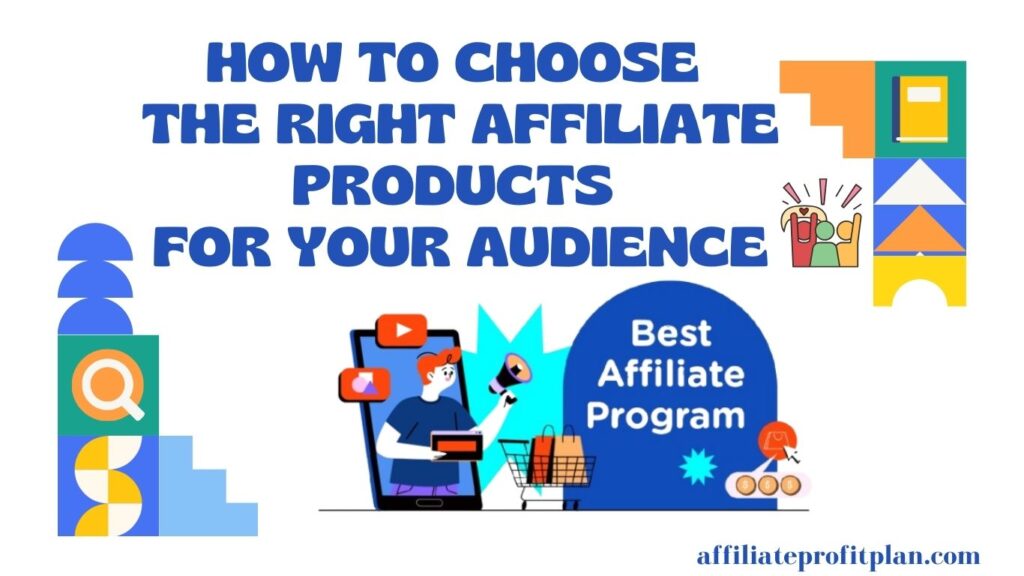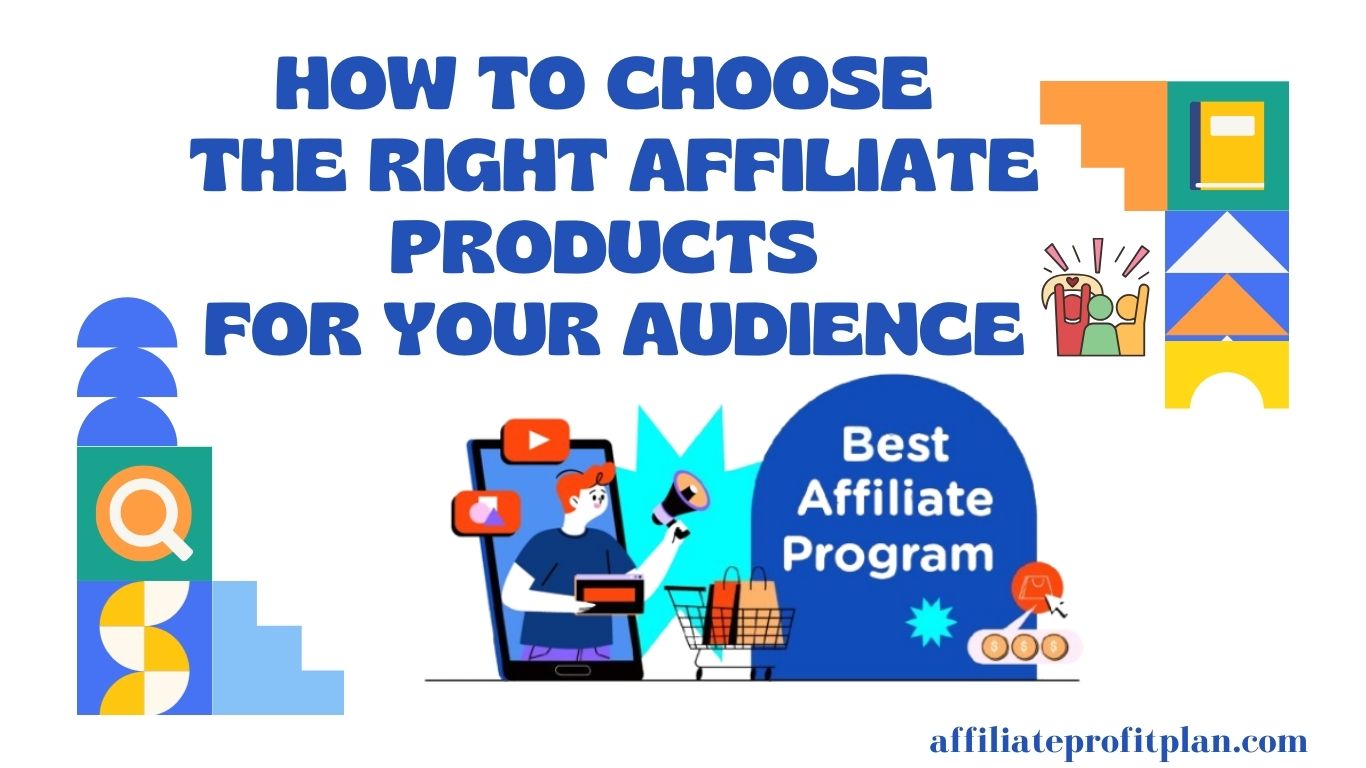Welcome to my article How to Choose the Right Affiliate Products for Your Audience. When it comes to affiliate marketing, selecting the right products for your audience is like finding the perfect gift for a friend. You wouldn’t give a fitness enthusiast a book on cake decorating, would you? (Well, unless it’s a low-carb, protein-packed cake book, then you’re onto something!) The same logic applies when choosing affiliate products—you need to pick items that not only resonate with your audience but also solve their problems or meet their interests.
In this guide, we’ll break down the process of choosing the best affiliate products that align with your niche, appeal to your audience, and boost your commissions. By the end, you’ll feel like the Cupid of affiliate marketing—armed with the knowledge to make perfect matches between your audience and the products they’ll love (and buy). Let’s dive in!
Access My Proven Blueprint for $50-$100 Daily Income – Watch This FREE Video Now >>>

Understand Your Audience’s Needs and Interests
Before you can choose the perfect affiliate products, you need to do a little detective work. No, you don’t need a magnifying glass and a trench coat (unless that’s your thing). But understanding your audience’s needs and interests is like being a mind reader—except you don’t have to guess because there are some clever ways to get inside their heads. And trust me, the effort is worth it. After all, you wouldn’t sell winter coats to people living in the tropics, right? Or a pet grooming kit to someone without a pet (awkward)?
So, how do you figure out what your audience really wants? It’s simpler than you think! Start by diving into your audience demographics—who are they, what do they do, and what keeps them up at night? Are they busy professionals looking for productivity hacks? New parents desperate for a full night’s sleep? Fitness fanatics hunting for the next great supplement? Knowing these details will help you narrow down the types of products that are not just interesting but useful to your readers. And believe me, nothing says “click my affiliate link” like offering a product that solves a real problem.
Don’t stop there, though. Get interactive! Use tools like surveys, social media polls, or just good ol’ email feedback to ask your audience what they’re struggling with or what products they’re eyeing. Think of this like asking for gift suggestions before the holidays—except now you know exactly what to offer, minus the ugly sweater mishaps. The more you understand your audience’s needs, the more successful your affiliate marketing efforts will be. Your audience will feel like you’re reading their minds (in the least creepy way possible), and you’ll have the perfect products ready to serve them. Win-win!
Focus on Products Relevant to Your Niche
Imagine walking into a bakery and being offered car tires instead of croissants. Weird, right? That’s exactly how your audience feels if you start promoting products that don’t fit your niche. If your blog or platform is all about health and fitness, suddenly promoting luxury handbags is not only confusing—it’s downright off-putting. Your audience came for the protein shakes, not the Prada. That’s why it’s so crucial to stick to products that align with your niche. It keeps your brand consistent and, most importantly, keeps your audience happy (and not wondering if they took a wrong turn on the internet).
When you’re choosing affiliate products, think of yourself as a curator. You’re selecting only the best items that fit naturally into your niche and what your audience already expects from you. If your content is focused on tech reviews, your followers want to know about the latest gadgets, not gourmet cooking kits (unless you find a robot that can also cook dinner—then I’m all ears). The idea is to keep everything cohesive. A well-chosen product recommendation feels like an organic part of your content, not a random pop-up ad that screams “I just want your clicks!”
And here’s the real magic: when you focus on niche-relevant products, not only do your recommendations feel more authentic, but they’re also way more likely to convert. Why? Because your audience already trusts you as an expert in that space. They come to you for advice on [insert your niche here], so when you recommend something, it feels like a tip from a friend, not a pitch from a salesperson. That’s the sweet spot—where conversions go up, trust is built, and your audience feels like you truly get them. So, keep your affiliate products in the family—your niche family, that is!
Evaluate Product Quality and Brand Reputation
Recommending a product without checking its quality is like showing up to a potluck with a mystery casserole that even you haven’t tasted. Sure, it might look good on the outside, but one bite could reveal a culinary catastrophe. The same goes for affiliate marketing—if you’re pushing products without knowing their quality, you’re risking your reputation (and possibly some very disgruntled followers). Trust me, your audience will remember that time you recommended a cheap knockoff that broke two days after purchase. And let’s be honest, no one wants to be the person responsible for the internet’s worst impulse buy.
Access My Proven Blueprint for $50-$100 Daily Income – Watch This FREE Video Now >>>
So, how do you avoid this affiliate marketing disaster? First things first: always do your homework. This isn’t high school, so don’t worry—you won’t be graded, but your earnings might depend on it. Start by researching product reviews, checking out customer feedback, and digging into the product’s performance. If a product has more 1-star reviews than a bad horror movie, it’s probably time to steer clear. Pay attention to recurring complaints and red flags, like poor durability or bad customer service. In the world of affiliate marketing, quality isn’t just king—it’s the whole royal family. High-quality products mean happy customers, which translates to repeat clicks, conversions, and commissions for you.
But don’t stop at the product itself. You also need to evaluate the brand behind it. Would you trust a car dealership with a sketchy reputation? Probably not. The same goes for affiliate brands. Look into the company’s background—are they known for reliable products and excellent customer service, or are they infamous for leaving customers in the lurch? A reputable brand can make all the difference in your audience’s experience. You don’t want your audience shaking their fists at the sky when their order never arrives or their refund request disappears into a black hole. Associating yourself with solid, trusted brands not only protects your reputation, but it also builds loyalty with your audience.
In short, don’t cut corners when it comes to product quality and brand reputation. Your audience is trusting you to lead them to products that are worth their hard-earned cash, not something that will fall apart faster than their New Year’s resolution. So, do the legwork, vet those products, and become known as the person who only recommends the best—because that’s where the real affiliate magic happens.
Check Affiliate Program Terms and Commission Rates
Affiliate marketing is a bit like dating—you don’t want to commit to something without knowing the terms, right? Before you go all-in on promoting a product, you need to make sure the affiliate program’s terms and commission rates are worth your while. Think of it as reading the fine print before signing the dotted line. Sure, that product might look like the perfect match, but if the commission rate is lower than your grandma’s thermostat in summer, you might want to reconsider. After all, you’re here to earn, not just hand out free advertising!
First, let’s talk commission rates. Not all affiliate programs are created equal. Some will generously reward you for every sale, while others will leave you wondering if your efforts are paying off in peanuts. You’ll usually find that commissions can range anywhere from 1% to 50%, depending on the product and industry. Physical products, for example, tend to have lower commissions (hello, 5% on that coffee maker), while digital products like software subscriptions or online courses can offer much juicier payouts. But don’t get too distracted by sky-high commission rates—make sure the product is something your audience will actually buy. A 50% commission on a product no one wants is still $0. Spoiler alert: that’s not going to pay your bills!
Now, onto the affiliate program terms—this is where you’ll want to break out your magnifying glass and pay attention. Some programs have cookie durations so short, they practically evaporate. The longer the cookie duration, the better, because it means you have more time to earn a commission after someone clicks your affiliate link. For example, a 30-day cookie means that even if your reader takes their sweet time deciding to buy, you’ll still get credit for the sale. But if it’s a 24-hour cookie? You better hope your audience has lightning-fast decision-making skills. Also, check for payout thresholds. Some programs require you to hit a certain amount of earnings before they’ll send you your hard-earned cash—so make sure you know when you’ll actually get paid!
And let’s not forget recurring commissions. Yes, you read that right—recurring. If you can find a program that pays you again and again for subscriptions or renewals, it’s like hitting the affiliate jackpot. It’s like planting a money tree—you do the work once, and it keeps bearing fruit month after month. Products like membership sites, software subscriptions, and online services often offer these sweet deals. Sure, it might not be an instant windfall, but over time, those recurring commissions can add up to a steady stream of income that feels like passive magic.
So before you dive headfirst into promoting a product, make sure you’ve checked all the terms, crunched the numbers, and done the math on those commissions. Think of it as choosing the perfect business partner—they should work for you, not the other way around. After all, your time and effort are valuable, and the right affiliate program should reflect that!
Test the Products Yourself Before Promoting
Recommending a product you haven’t tried is a bit like raving about a restaurant you’ve never eaten at—sure, the menu looks good, but how do you know if the food isn’t going to give someone a three-day food coma? Testing the products yourself is the golden rule of affiliate marketing. Not only does it give you firsthand knowledge to share with your audience, but it also ensures that you’re not accidentally endorsing the digital equivalent of an overpriced paperweight. (And trust me, no one’s going to thank you for that!)
When you test a product, you get to see what’s under the hood. Is that shiny new gadget really as life-changing as the marketing claims, or does it fall apart faster than a house of cards in a hurricane? Maybe that skincare product promises to give you the glow of a Greek goddess, but after using it, you realize it’s more like giving your skin the texture of a sandpaper sponge. By trying it out yourself, you’ll know if it’s the real deal or just all hype. This lets you give your audience the inside scoop, making your recommendations honest, relatable, and—most importantly—trustworthy.
Plus, testing a product gives you the fuel to write killer content. You’re not just repeating the company’s sales pitch, you’re sharing your personal experience. You can talk about what you liked, what could be better, and how it helped you (or didn’t). Your audience will appreciate the honesty, and they’ll trust you more because you’re not just out there to make a quick buck—you’re genuinely looking out for their best interests. Sharing your own photos, videos, and real-life results makes your review feel more authentic. Heck, people might even start thinking of you as their go-to guru for product recommendations.
And let’s not forget the peace of mind that comes with knowing you’re not promoting a lemon. Imagine pushing a product to your audience only to have them come back in droves, angry and wielding negative reviews like pitchforks. Not a good look. But if you’ve tested the product and stand by it, you can confidently promote it, knowing you’ve done your due diligence. Worst-case scenario, the product wasn’t great—at least now you can give your audience a heads-up on what to avoid.
So, before you throw that affiliate link into your content and hope for the best, take a moment to ask yourself: “Have I actually tried this thing?” If the answer is no, maybe it’s time to give it a test run. Who knows? You might discover it’s even better (or worse) than you expected. Either way, you’re putting your reputation and your audience first—which is how affiliate marketing should always be done.
Conclusion
So, there you have it! Choosing the right affiliate products for your audience isn’t rocket science, but it does take a little bit of strategy, a dash of research, and a whole lot of common sense. You wouldn’t recommend a product to your best friend without knowing it’s something they’d love, right? The same rule applies to your audience—treat them like friends (except maybe without the birthday gifts and occasional venting sessions), and only offer products that truly add value to their lives.
Access My Proven Blueprint for $50-$100 Daily Income – Watch This FREE Video Now >>>
From understanding what makes your audience tick, to sticking with products that fit snugly into your niche, to thoroughly vetting quality and commissions, the process is all about making thoughtful choices. It’s like being the best party host: you wouldn’t serve your guests mystery meat and expect them to leave happy, would you? (Unless it’s a really cool mystery, like “Is this steak or seitan?” In that case, carry on.) Instead, you’d curate a menu full of crowd-pleasers. The same goes for affiliate products. Only serve up the good stuff.
And let’s not forget—actually trying the products yourself is like taste-testing before sending out the dinner invitations. You don’t want your audience taking a bite of something that looked amazing online but left a bad taste IRL. When you personally test what you promote, you’re building trust, offering real value, and showing your audience you’ve got their back. That’s the secret sauce to affiliate marketing success: authenticity, reliability, and a commitment to putting your audience first.
So, go ahead and start curating those perfect affiliate product picks, armed with all the knowledge and tips we’ve covered. Your audience will thank you, your commissions will thank you, and hey—you might even have fun along the way (and maybe discover some cool products for yourself!).
Thanks a lot for reading my article on “How to Choose the Right Affiliate Products for Your Audience” till the end. Hope you’ve helped. See you with another article.










